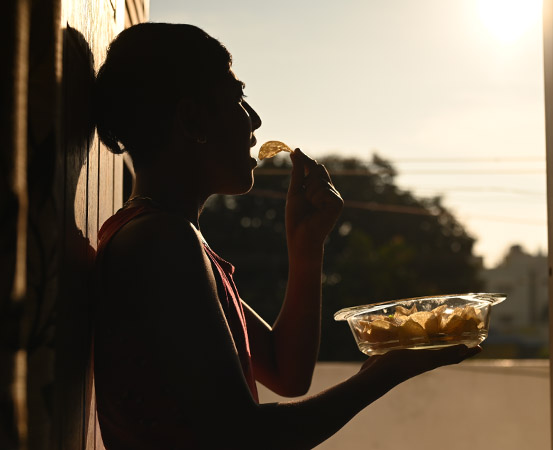
While salt is an essential ingredient required for the proper growth and development of a child, its consumption is on the higher side among children, thanks to processed and junk foods. This habit, often overlooked by parents on the go, can lead to severe consequences, say doctors.
The World Health Organization (WHO) recently came up with recommendations for reducing sodium intake to control blood pressure in children between two and 15 years old. It stated, “The recommended maximum level of sodium intake of 2 grams per day in adults should be adjusted downward based on the energy requirements of children compared to those of adults.” According to Dr Kavitha Bhat, senior consultant – pediatric endocrinology, Aster Women and Children Hospital, Whitefield, Bangalore, children below one year of age should not be given salt in their diet.
Salt intake in children: Processed foods are the main culprit
A child’s salt consumption spikes as they dive into packets of processed foods. Having high-sodium foods is synonymous with salt cravings in children, which parents might initially overlook. Additionally, children who develop a craving for salt become fussy eaters as they grow older, warns Dr Swetha RD, consultant, pediatrics, Rainbow Children’s Hospital, Bangalore. They can develop a craving for processed foods, especially when they are stressed or bored. Hence, it’s imperative for parents to watch out for signs of salt craving in their children. “There have been multiple instances where parents complain that their children are having trouble breaking their junk food habit,” she shares.
Experts also highlight that teens, along with their parents, turn a blind eye to the nutrition labels provided on food products. Just like caffeine and sugar, salt is also an addictive substance and can lead to cravings. According to Dr Swetha, excess salt consumption can cause dehydration in children. Sodium is a crucial mineral that maintains the water and mineral balance in the body, along with aiding nerve and muscle function. A child high on salt consumption can experience fatigue and frequent thirst. “If a child is constantly thirsty, it’s a sign that their body is demanding more water due to high salt intake,” says Dr Swetha, adding that the normal range for sodium in the blood is 135 to 145 milliequivalents per liter.
What causes salt cravings in children?
Stress can be a factor for high salt consumption in children. In addition, Dr Bhat says that Addison’s disease could also be a factor. It’s a rare hormonal disorder where the adrenal gland (located on top of the kidneys) produces insufficient amounts of cortisol and aldosterone. This leads to kidney malfunction. “When salt levels drop in the child’s system, they may feel dehydrated and want to drink more water,” she notes. It’s also important to check for any underlying conditions that may be causing a dip in sodium levels for which the body is trying to compensate.
How salt intake harms children’s health
Dr Swetha says that increased salt intake puts additional strain on the kidneys, making them work harder to filter out the excess sodium. This will make children urinate more frequently, due to which minerals like calcium can be lost from the body. As a result, their muscles and bones will weaken. “Parents also need to check for swelling in the hands and feet of their children, which occurs due to high sodium levels in the body,” she adds.
Salt intake in children: What parents can do
According to Dr Bhat, parents should keep processed or junk food away from children between the ages of one and five years old, as their taste buds mature and eating habits develop during that time. “It is also a period where their kidneys are developing. If salt-rich foods are introduced at this time, their kidneys would not be able to take it well,” she explains, voicing her concern that the majority of junk food eaters are school-going kids.
Adolescents who consume salt in excess are prone to high blood pressure, obesity, osteoporosis and other cardiovascular conditions in the long run, says Dr Bhat. “In order to avoid any such consequences, the cravings should be addressed immediately,” she informs. A study conducted at Tulane University, US states that excess intake of salt in the daily diet increases the risk of type 2 diabetes.
Processed and other salt-rich foods can be replaced by fruits, vegetables, pulses and dairy products, all of which contain sodium. Vedika Premani, consultant – dietetics & nutrition at Sir H N Reliance Foundation Hospital, Mumbai, suggests refraining from adding extra salt to foods that don’t require it. She says that parents must provide healthier, homecooked meals to their children with the required salt content. “Whenever cooking is done in a large household, parents must save a portion for the child with the required salt amount. Food items like daal and roti don’t require a lot of salt,” she explains.
Takeaways
- Salt cravings can occur in children due to stress, boredom and emotional eating.
- Frequent thirst and dark urine in children are warning signs that they’re consuming salt-rich foods.
- Parents should not include salt in the diet of children under one year old.
- Parents must ensure children avoid or limit the consumption of processed foods like meat, chocolate and chips. They should provide a healthy diet to their children that includes fruits, vegetables, pulses and dairy products.

















